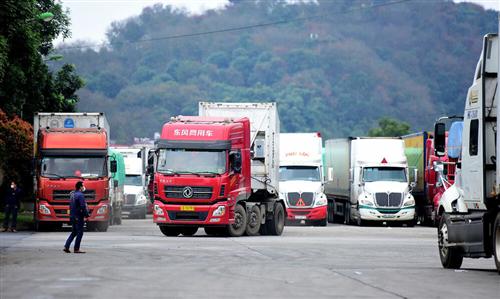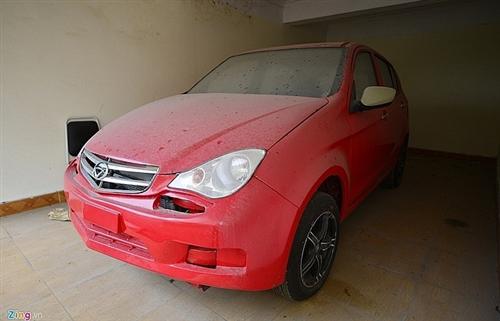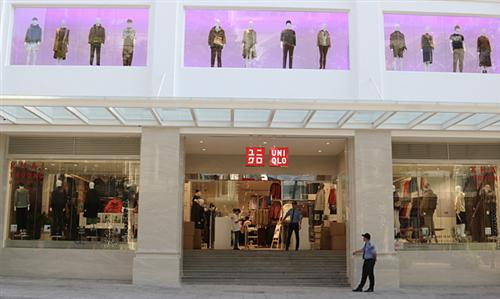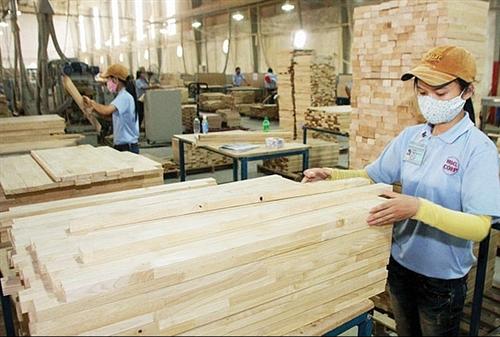Factories hit by coronavirus lockdown in northern Vietnam province
Factories hit by coronavirus lockdown in northern Vietnam province
"We are always awaiting your return. Keep going," a Japanese CEO texted to the company's 225 workers being quarantined in Vinh Phuc Province.
From Son Loi Commune’s An Lao village, it is just over a 10-minute walkto the Kohsei Multipack factory. The Japanese-South Korean company is in the Binh Xuyen Industrial Park, the pride of the northern province.
The villages in Son Loi Commune, and in fact the entire Binh Xuyen District, are much different from most villages in the Red River Delta: Only 5 percent of working age residents here are employed in the agriculture sector but the rest do not need to migrate to cities to look for factory work unlike elsewhere since Binh Xuyen is already the industrial heart of Vinh Phuc.
A typical Vietnamese is likely to have built their house with bricks and tiles made in Son Loi and be riding a motorbike partially manufactured by workers from Son Loi.
Seventy percent of the commune's working age residents work in factories in the area, which also make parts for leading Japanese automobile manufacturers.
About a third of Kohsei Multipack Vietnam's employees are from Son Loi, but in the last two weeks barely anyone could be seen on the road leading from the villages to the factory.
Before Son Loi was placed under lockdown in an attempt to contain the Covid-19 outbreak, the factory had been operating normally since the management did not want to create any apprehensions.
But the moment the commune was locked down on February 13, an indirect lockdown also occurred at many production lines in Binh Xuyen.
"In the history of the company, there has never been a time when so many workers went on leave at the same time like this," Tran Thi Thanh, head of the workers' union, said.
The management had to hold a meeting to consider two issues: the impact on production and on employees' psyche. While the former has not been an issue thanks to the remaining workers responding to the company's call to work overtime, the latter is proving to be a problem.
Many of the workers are their families' breadwinners, and so, though they know they must comply with the quarantine order, bombard Thanh with text messages saying, "I don't want to be on leave; without work where would I get money to live?"
The company is therefore considering paying the quarantined workers their wages. This, combined with the inability to execute orders in time due to the worker shortage, could cause big losses.
Kohsei has however promised it will not hire seasonal workers, and its Japanese CEO has texted every worker to encourage them and promised to wait for their return.
Located west of Son Loi's Ngoc Bao village is the factory of South Korean garment company Kumnam Print. It has had to shut down three production lines since 40 out of its 100 workers are from Son Loi.
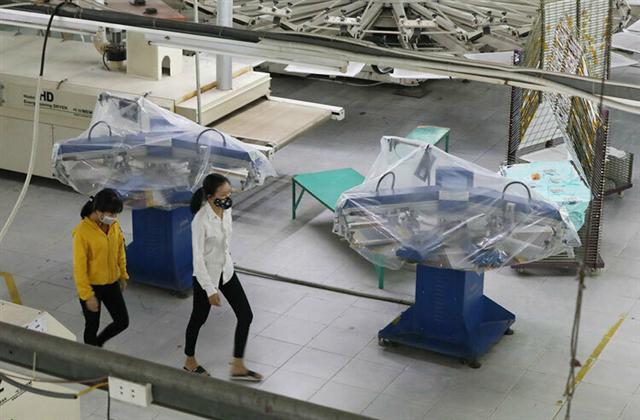
Two workers walk past equipment covered in plastic at South Korean garment company Kumnam Print in Vinh Phuc Province, northern Vietnam, where the coronavirus outbreak has forced it to suspend several production lines, February 2020. Photo by VnExpress/Ngoc Thanh.
|
Many pieces of equipment across the 4,000-square-meter factory are wrapped in plastic while the remaining 60 employees work in silence, all with masks on their face.
The company is also struggling with orders halving since its partners in South Korea and Hong Kong have also been hit by the Covid-19.
By this time each year the partners' inspection teams would have sent emails with the schedule for their inspection of the factory's environmental standards, "but now they have gone quiet."
In addition to having to look for more workers to replace the ones being quarantined, Kumnam Print also has to look after those still coming to work.
Over the past week Le Thi Hong Hanh, head of the administrative division, had made countless phone calls to the Vinh Phuc Business Association and face mask manufacturers to try and buy masks for the workers, but without success.
She then spent an entire afternoon visiting all 20 pharmacies in Phuc Yen Town, but couldn't find a single box of masks.
While it requires 3,000 masks, the company has only managed to buy 1,000, and has already used up most of them.
The 40 workers in quarantine still get their basic wage of VND3.92 million ($169). Should the epidemic last for a few months or more, Kumnam Print said it would continue to pay them from its reserve fund.
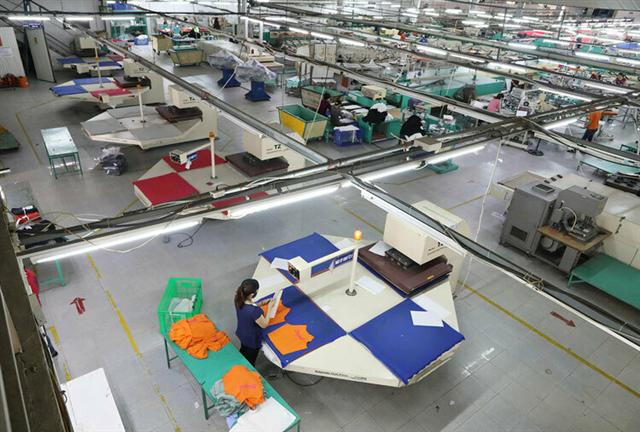
Only a few workers now come to work at Kumnam Print in Vinh Phuc Province, northern Vietnam, February 2020. Photo by VnExpress/Ngoc Thanh.
|
For the last decade or so Vinh Phuc has been considered a shining light in attracting investment in industry, and industrial parks in Binh Xuyen now account for more than half of the province's industrial production.
Investors in Binh Xuyen receive incentives in return for official or unofficial pledges to employ local workers. The fate of the local community and the factories are therefore intertwined, and many investors are partially going through what Son Loi residents are.
A factory making car parts could for instance have an order delayed because a partner is concerned it is situated in an epidemic-affected area.
Two days after Son Loi's lockdown came into effect, six employees of a company inside the industrial park were told by local officials to stay home and not to go to work.
Another company in the Binh Xuyen Industrial Park that manufactures electronic components for its South Korean partner has had to hire 20 seasonal workers after nearly 100 of its workers had to be quarantined.
In its recruitment notice, the company said applicants "must not be from Vinh Phuc."
With Kohsei paying its workers an average monthly income of VND7.5-8 million, the loss of income for a family in which both husband and wife are quarantined for 20 days could be equal to an entire year's worth of savings for them.
As for the companies, industrial park managers have not been able to determine their losses caused by the quarantine so far.
However, above all else, what the companies want the most is for "our workers to be fine and return to work at the end of the quarantine period," a Kumnam Print executive said.





